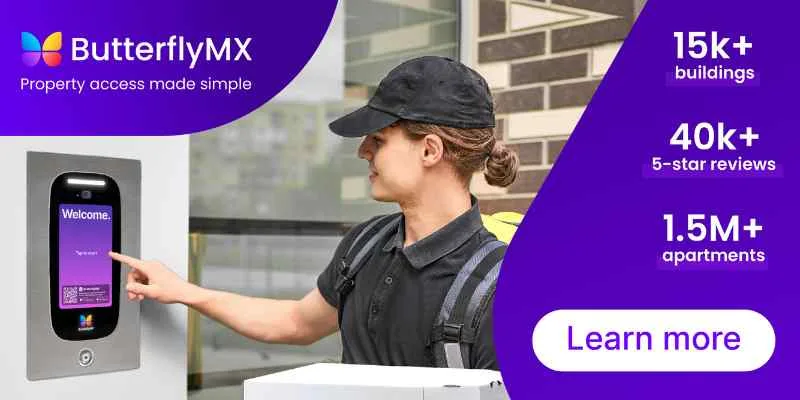Key takeaways
- Real estate technology trends like AI will not replace real estate agents but rather improve their roles by enhancing how they market to customers and analyze data.
- Some real estate technologies, such as building management systems (BMS) and digital twins, are helping address climate change.
- While data is essential for marketing and investing, it’s even more crucial to protect customers’ personal data.
- Virtual reality, social media, and mobile apps are helping attract younger prospects.

No industry is immune to rapidly advancing technology, and that includes real estate. Real estate technology, also known as property technology (proptech), is changing how we buy, rent, sell, and manage our properties. Over the next few years, technology will radically reshape multifamily, residential, and commercial real estate.
In the past, owning and managing a property simply meant washing the windows, tending to the facade, and keeping the lobby clean. Now, property technology can help you do more with your property than ever before. New devices make it possible to keep your building safer, cleaner, and smarter.
This post covers:
11 best real estate technology trends in 2025
The 11 real estate technology trends that are currently shaping the industry include:
- Artificial intelligence
- Blockchain
- Internet of Things
- Virtual and augmented reality
- Apps and social media
- Drones
- Digital twins
- Building management systems (BMS)
- Big data
- Data security
- Digital transaction management
1. Artificial intelligence
Artificial intelligence (AI) is everywhere in multifamily, from chatbots to data analysis. But don’t worry. It’s not the scary robots you see in science fiction movies. Instead, it’s a powerful force that makes your property smarter and more connected.
The vast amount of data collected daily through internet searches, social media, and connected devices is incredibly valuable. However, its sheer volume is overwhelming. Further, AI can quickly comb through these data to identify trends, such as forecasting future trends. In real estate, this means potentially predicting trends that impact housing/rental prices due to neighborhood growth, which leads to more accurately priced inventory.
How AI is used in real estate
Property owners and brokers can use AI to pinpoint potential buyers for a particular unit. Then, they can reach out to them with a personalized sales pitch.
What’s more, artificial intelligence has the unique ability to streamline processes, allowing you to focus on other projects that keep your property and organization thriving.
Overall, AI in real estate can help with:
- Drafting leases, contracts, listings, and more.
- Chatting with and scheduling appointments with prospects.
- Evaluating market trends and rental rates.
- Analyzing data for better decision-making.
- Modeling 3D renderings of properties.
- Managing and monitoring building systems.
2. Blockchain
With hacks and data breaches on the rise, security is a huge concern these days. Blockchain is a distributed ledger that allows transactions between two parties in a verifiable and permanent way. Real estate professionals no longer need to rely on Excel spreadsheets or, worse, pen and paper. Instead, blockchain technology offers workflow automation and secure transfer of information such as titles and account numbers.
Ever popular, blockchain transfers data and personal information through a series of dispersed ledgers to keep it secure. It greatly reduces fraud when used for large transactions — like selling real estate. It also gives customers and realtors access to more data once their identities are verified. Furthermore, blockchain technology could alter how we negotiate and pay for real estate.
3. Internet of Things
Forget the old intercom systems that make you try your luck at calling a resident in the building and hoping they’re home. Those are clunky, time-consuming, and unreliable — an artifact of the past.
From smartwatches to self-driving cars, the Internet of Things (IoT) is vastly changing our way of life. IoT refers to devices that exchange information with other devices using the internet. Today, IoT even allows property owners and residents to turn their smartphones into mobile video intercom systems.
That means no matter where you are, you can see who is trying to get into the building. It’s easier and more convenient to welcome visitors, and it’s safer to control who has access to the building. Also, it allows property owners and managers to easily track who is entering the property to ensure tenants’ safety and security.
Since these devices are cloud-based, they can connect with other smart appliances and devices within a building. With smart devices, residents can do things like automatically call the elevator, turn on the air conditioning in the unit, and preheat the oven.
How IoT intercoms introduced a new era for property security
IoT intercoms simplify and enhance the resident experience. Since IoT intercoms are cloud-based, connecting smartphones and integrating them with existing property management software is easier.
Further, the data stored in the IoT intercom is encrypted, making it difficult for hackers to access the information. What’s more, the best video intercoms also keep a video trail of all door release events, making it easy to detect any suspicious activities in the building.
Learn more about real estate technology trends:
4. Virtual and augmented reality
Imagine being able to view a property without actually setting foot inside of it. Virtual reality (VR) transports people around the world so they feel like they’re somewhere else.
This has enormous potential for real estate, as buyers can use VR to walk through a property like they’re there, even if they’re on the other side of the world. Moreover, using VR, companies can create virtual home tours and showcase the neighborhood, allowing prospects to walk down the street. Virtual reality makes the world smaller and opens the door to viewing and renting property from anywhere.
Similarly, augmented reality helps people see virtual additions to their current location. This technology doesn’t transport you somewhere new but instead adds things to your current view.
Consequently, augmented reality is already allowing property owners to see furniture in their homes or view renovations before actually making them happen. Augmented reality showcases a property’s potential and helps people make decisions before taking action, saving time and money in the long run.
5. Apps and social media
Everything is connected today, which makes for smarter homes that are easier to control. Instead of waiting for a business to open to make a phone call and wait on hold, people can now use apps and chatbots to communicate with companies conveniently.
Some apps can even speed up the purchase of real estate and expedite project completion. You can use an app to find the perfect home, chat about financing, and learn about renovations and projects you’re interested in.
Apps and social media also speed up real estate transactions. If a popular property is available, you don’t have to wait to talk to someone to schedule a time to see it. You can simply use an app or bot to find the answers you need to move the transaction along.
The influence of social media
More than half of the world’s population uses social media, a powerful marketing tool. Whenever potential renters or buyers are deciding on a property, they’ll turn to social media to view photos and reviews. Additionally, current residents will turn to social media to engage with their communities and connect with neighbors.
Social media is a robust marketing tool for real estate professionals to attract new residents and retain existing ones.
Fun fact: Residential property tours are now happening on TikTok, making them more accessible and desirable to younger renters.

6. Drones
Drones are a real estate technology trend offering new ways of marketing and inspecting real estate.
More specifically, drones are able to:
- Take unique videos and photos of the property for better marketing materials.
- Assist in inspecting buildings where it may be difficult for a person to reach, such as the roof, gutters, or siding.
- Map out the layout and architecture of a property or a neighborhood to better track changes in development.
7. Digital twins
A digital twin represents physical objects or processes in a digital environment designed to simulate real-world scenarios. In real estate, digital twins are properties created using data from many IoT and sensors.
By using a digital twin of your property, you can simulate a variety of scenarios to determine how they will affect it. For instance, you can simulate an earthquake to observe how effective your property is at withstanding its effects. Based on the results, you can better prepare for future environmental events.
Of course, digital twins work for numerous situations, ranging from natural disasters and fire evacuations to routine maintenance and performance.
8. Building management systems (BMS)
Also known as building automation systems (BAS), a BMS monitors and controls a building’s mechanical and electrical systems. Managing a building’s utilities and functions as efficiently as possible is paramount in a world where climate change is an ever-growing threat.
At the most basic level, these systems collect data from sensors located throughout the building. The sensors connect to a network where the data is collected and displayed in the BMS. This way, you can identify areas where your building is not operating as well as it should. As a result, the BMS will detail what the issue is and where it’s located, allowing you to perform maintenance before it becomes serious, lowering repair costs, and eliminating downtime.
As you can see, a building management system can significantly lower maintenance costs and reduce resource consumption by optimizing every aspect of your property. In addition, you can improve the comfort of your property by personalizing things like lighting and temperature to your customer’s preferences, which further entices them.
9. Big data
Essentially, big data is a massive volume of structured and unstructured data with a lot of variety and velocity. In other words, big data is a lot of information that comes from various sources fast.
With such information, real estate developers can better inform themselves about a potential investment opportunity by offering analysis of certain criteria like demographics, market trends, and tenant preferences. Meanwhile, leasing agents can better understand their target renters. Big data offers insights into customer behavior and preferences. In turn, agents can effectively market to their audience and garner new leads.
Regardless of how it’s used, big data can help you make better real estate decisions.
10. Data security
People are more aware and diligent about their personal data than ever before. For that reason, it’s critical you protect your property’s data at all costs.
Although it’s required by the government to protect sensitive data, it’s also worthwhile for the reputation and well-being of your property. Otherwise, a severe data breach could do significant harm to not only your finances but also your public perception.
Fortunately, numerous cybersecurity tools are available to protect your property’s digital assets. You should also consider working alongside a cybersecurity company to help encrypt your data, monitor and prevent potential cyberattacks, and manage potential risks. That way, you’ll be better prepared for digital threats.

11. Digital transaction management
Sometimes, the biggest technology trends are the least complex. Digital transaction management is the system that you have in place for people to review and sign contracts and other documents electronically. The wonders this does from an organizational perspective are massive. By going digital, you reduce the need to print and file physical paperwork. Instead, everybody can save copies of the information that they need directly to their mobile devices.
Real estate technology trends FAQs
Proptech is rapidly evolving the real estate industry, making it difficult to stay knowledgeable.
So, here are some commonly asked questions regarding technology in real estate:
- What is the newest technology in real estate?
- How big is the real estate technology market?
- What technology does a realtor use?
- Will technology replace real estate agents?
- Is the real estate industry growing or declining?
- What are the pros and cons of technology in real estate?
What is the newest technology in real estate?
The newest real estate technology includes tech such as AI, blockchain, and virtual reality. All of this technology is continuously evolving. For example, most AI software releases regular updates to ensure information is fresh and the output is up to date.
How big is the real estate technology market?
According to Fortune Business Insights, the value of the proptech market was $33.57 billion in 2023, with an expected compound annual growth rate (CAGR) of 11.9% until 2032.
What technology does a realtor use?
Aside from the real estate technology trends listed above, realtors use customer relationship management (CRM) software. This tool allows storing customer information, tracking leads, recording maintenance issues, and managing marketing campaigns in a single software.
Will technology replace real estate agents?
No. Real estate agents will not be replaced with technology.
While artificial intelligence can automate tasks and make others more streamlined, it isn’t suited to perform all of a realtor’s duties. For instance, realtors can better navigate an emotional situation regarding a property or leasing to which AI is not delicately attuned. In these situations, an experienced human real estate agent is best.
Is the real estate industry growing or declining?
The real estate industry is steadily growing at an annual CAGR of 4.51%, according to Statista.
What are the pros and cons of technology in real estate?
In general, technology’s goal is to make a job or task easier or automate it entirely. However, technology can also bring a few drawbacks that need consideration.
Pros of technology in real estate include:
- Simplifies or automates tasks.
- Reduces time and money spent.
- Streamlines communication.
- Improves the customer experience.
- Capable of operating 24/7.
Cons of real estate technology include:
- Takes time to learn and use new technologies effectively.
- Requires regular updates/maintenance to function properly.
- May be costly to install or operate.
- Older users may have a hard time learning.

Learn more about ButterflyMX
Fill in the form below, and we'll email you right back.
Have questions?
Fill in the form below, and we'll email you right back.






